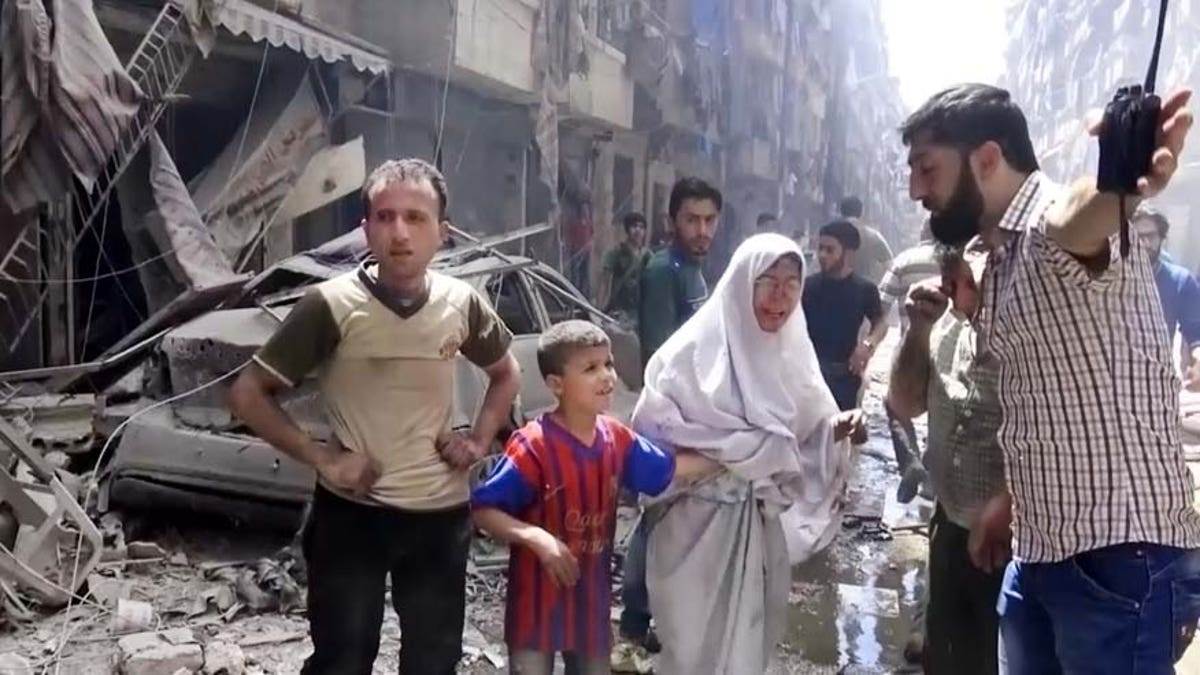
In this image made from video and posted online from Validated UGC, a man leads a woman in tears and child out of the scene after airstrikes hit Aleppo, Syria, Thursday, April 28, 2016.
On May 5, rockets struck a small settlement for displaced people in northern Syria, killing 28 and wounding at least 40 more. This brutal incident was a horrifying confirmation that despite strenuous international efforts to achieve a “cessation of hostilities,” the civil war in Syria is still reaching every corner of the country and that desperate civilians have no place left to go.
News reports have called this place “Koumana refugee camp,” but it’s really more a loose collection of tents and tarps. My organization, Mercy Corps, has been working in this settlement since last October, providing basic household supplies like blankets and plastic buckets to use for bathing and washing dishes.
After the strikes hit last Thursday afternoon, we saw people running with those same buckets full of water, trying to put out the fires. The ground was littered with burned debris – their few remaining possessions now turned to ash – and the air filled with the acrid smell of melted plastic. The strike killed community members, mostly women and children, caught in their tents as they burned, while others sustained serious injury from the bombing itself.
With the largest non-governmental aid operation in Syria, Mercy Corps has been reaching about 570,000 people each month with food, household supplies and a range of other needed services. In the part of the country where Koumana was struck, we work with about 40 similar informal tent settlements.
They are not planned camps. They are places where families fled when fighting or bombing erupted near their homes or other places of refuge.
The luckier ones at these places have tents; others make do with makeshift shelters. Most brought little with them, desperate to get away from the front lines of the fighting and to find a safe place for themselves and their children.
Before last week’s strike, we had been seeing small shreds of hope emerge in places like Koumana. We brought children together to play games and do art projects as a means of offering them psycho-social support and a bit of respite from the trauma they are enduring.
One of these children is a nine-year-old girl named Sana. She has curly brown hair and big brown eyes with long lashes. When she first arrived, she was afraid and scared of everything around her. Our team spoke to her parents and invited her to join a group of children.
Sana became particularly interested in acting in small plays we organized – she quickly stood out as one of the most talented, leading the other kids in singing and acting.
Life inside the settlement was a far cry from what it used to be for these children. But at least, their parents reasoned, they would be safe here. Except they weren’t.
Where Sana is now we do not know. Her family fled – again – shortly after the bombing.
I am not a military expert; I am a humanitarian. I cannot tell you who dropped the bombs here and what their intention was. I can only tell you what I know – that this place was a quiet community of last resort. Most of the six hundred families living here had already been displaced multiple times, fleeing each fresh wave of violence until they ended up here, a scant few miles from the border with Turkey.
Now that last resort is on fire. About half the families have left, able to afford transportation and rent in a nearby village, or gone to live with relatives nearby. The other half remain. They have no options, nowhere to go and no money to get them there.
As humanitarians, we cannot end the war that surrounds the innocent men, women and children trapped in the crossfire of the conflict, but we must push and provide for their protection. There is no other choice: These innocent people have nowhere to run.
We look to Geneva, where the international community meets for the umpteenth time to decide the fate of Syria and its people, and we all long for peace.
Xavier Tissier is the North Syria Country Director for Mercy Corps. He has been with Mercy Corps since 2008 and joined the Syria team in 2014.








































